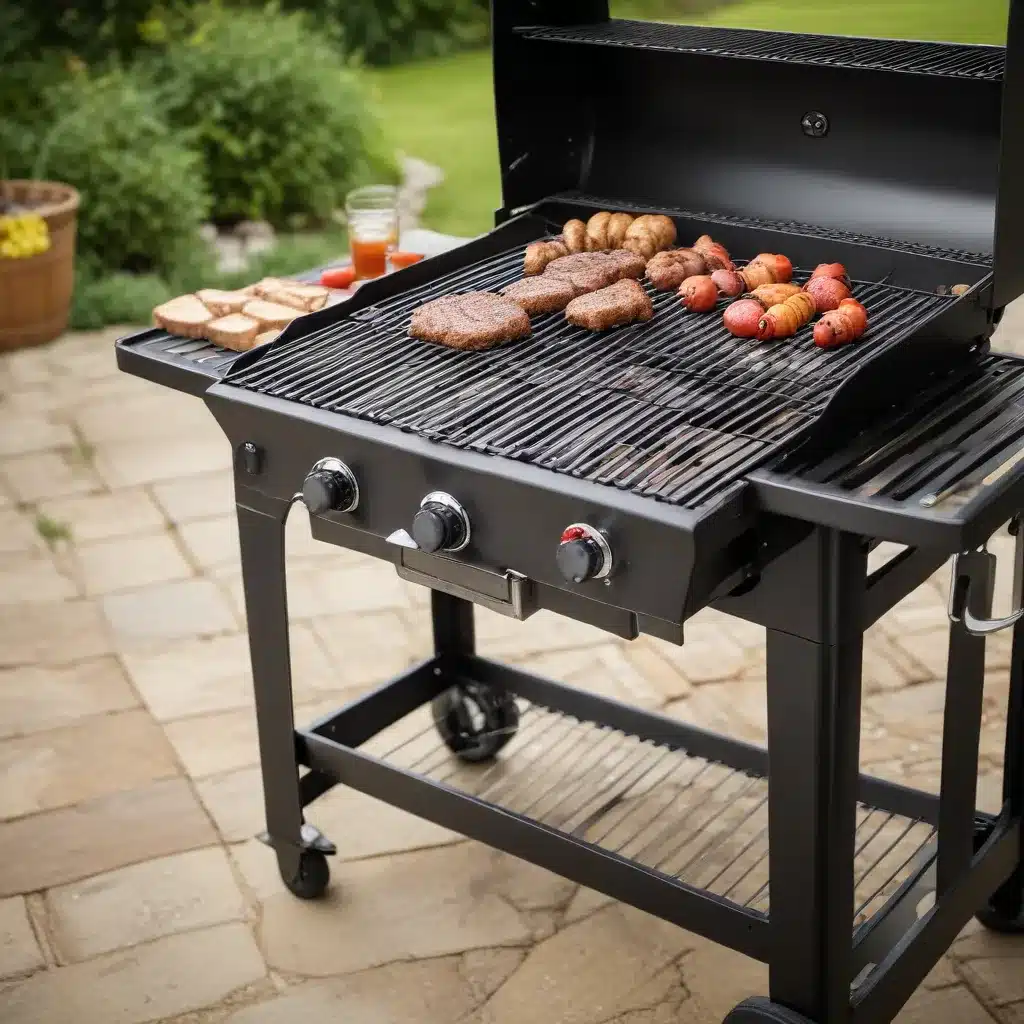
As an experienced barbecue pitmaster, I’ve spent countless hours perfecting my craft over the years. From slow-smoking briskets to searing juicy steaks, I’ve had the privilege of exploring the full range of barbecue techniques and equipment. And when it comes to the age-old debate of charcoal vs. gas grills, I’ve developed a deep appreciation for the unique advantages and considerations of each.
The Allure of Charcoal Grilling
For many seasoned pitmasters, myself included, the allure of charcoal grilling lies in the unparalleled flavor it can impart on your food. The smoky, robust notes that charcoal imparts simply can’t be replicated with a gas grill. When you’re looking to achieve that signature barbecue flavor, the intense and direct heat of a charcoal grill is hard to beat.
One of the key advantages of charcoal is the level of control it offers over the cooking process. By carefully managing the airflow and positioning of the coals, you can create hot spots, indirect cooking zones, and even temperature gradients to achieve the perfect sear or low-and-slow cook. This level of precision and fine-tuning is a true art form, and it’s a big part of what draws many pitmasters to the charcoal route.
Another aspect I love about charcoal grilling is the ritualistic nature of it. There’s something inherently satisfying about the process of igniting the coals, watching them transform into a glowing bed of embers, and then carefully arranging and adjusting them to achieve the desired cooking environment. It’s a meditative experience that connects us to the primal roots of live-fire cooking.
The Convenience of Gas Grilling
While the allure of charcoal is undeniable, I also appreciate the convenience and versatility of gas grills. For those times when you need to fire up the grill quickly for a weeknight meal or a spontaneous gathering, the instant-on, instant-off nature of gas grills can’t be beaten.
One of the key benefits of gas grills is the ease of temperature control. With the simple turn of a knob, you can adjust the heat levels precisely, making it a breeze to sear, grill, or slow-cook your dishes. This level of temperature precision can be especially helpful for tasks like indirect cooking or maintaining a consistent temperature for slow-smoked meats.
Another factor that often draws people to gas grills is the reduced cleanup and maintenance required. Charcoal grills can be messy and require the proper disposal of ash and spent charcoal, whereas gas grills often just need a quick wipe-down after use. This makes them a more convenient option for those with limited time or a preference for a more low-maintenance grilling experience.
Navigating the Charcoal vs. Gas Debate
So, which one is the right choice for your barbecue style? Ultimately, it comes down to personal preference and the type of cooking you enjoy most. Both charcoal and gas grills have their strengths and weaknesses, and the decision often depends on your priorities and the specific dishes you want to prepare.
If you’re a purist who values the smoky, authentic flavor of charcoal, then a charcoal grill may be the better fit for you. However, if convenience, temperature control, and ease of use are your top priorities, a gas grill could be the way to go.
It’s worth noting that there are also hybrid models that combine the best of both worlds, offering the flavor of charcoal with the convenience of gas ignition. These can be a great compromise for those who want to enjoy the benefits of both grilling methods.
Mastering Techniques for Both Charcoal and Gas Grilling
Regardless of which type of grill you choose, the key to becoming a true barbecue master is to invest the time in mastering the techniques and nuances of each cooking method. This means understanding the optimal fuel types, airflow management, temperature control, and cooking techniques for both charcoal and gas grills.
For charcoal grilling, it’s essential to experiment with different types of charcoal, such as lump, briquette, or specialty blends, to find the one that best suits your preferred flavor profile. Mastering the art of arranging the coals for direct, indirect, and two-zone cooking is also crucial for achieving consistently delicious results.
When it comes to gas grilling, it’s important to familiarize yourself with the features and controls of your specific grill model. Understand how to effectively manage the burners to create hot spots, indirect cooking zones, and controlled temperature gradients. Invest in high-quality grill tools, such as thermometers and heat-resistant gloves, to enhance your precision and safety.
Ultimately, the choice between charcoal and gas grilling is a highly personal one, and it’s worth exploring both to discover the method that best fits your cooking style and preferences. At the end of the day, the most important thing is to have fun, experiment, and continually hone your craft as a barbecue pitmaster.
Exploring the Creekside BBQ Difference
At Creekside BBQ, we’re passionate about sharing our expertise and helping fellow barbecue enthusiasts and pitmasters take their grilling game to new heights. Whether you’re a seasoned pro or just starting to explore the world of backyard barbecue, our team is dedicated to providing the knowledge, resources, and inspiration you need to become a true master of the craft.
From our carefully curated selection of high-quality grills and smokers to our library of step-by-step guides and mouthwatering recipes, we’re here to support your barbecue journey every step of the way. Join us as we explore the art of charcoal and gas grilling, uncover the secrets to creating unforgettable flavor, and celebrate the camaraderie and joy that comes with mastering the art of backyard barbecue.

